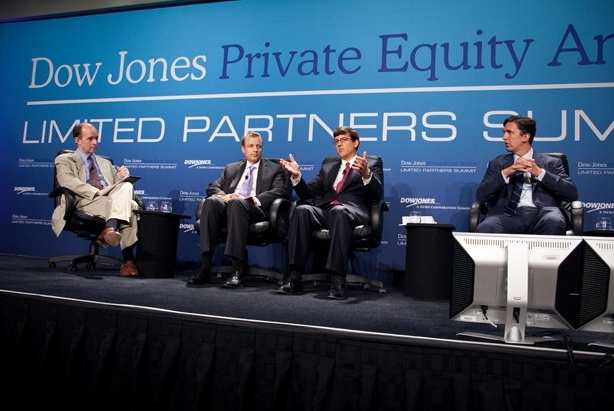Union Pension Fund Finances Runaway Shop

Craig Farr of Kohlberg Kravis Roberts, at right, joined other financiers for a panel discussion. Union pension money goes into KKR's capital ventures, even as the firm destroys union jobs. Photo: Dow Jones Events.
Mattress manufacturer Sealy is shutting down its North Portland, Oregon, factory, eliminating 128 jobs. The North Carolina-based company announced November 6 it would move production from the Steelworkers and Teamsters shop to a new, non-union plant two hours north in Lacey, Washington.
The announcement came after management had asked the union for concessions to keep the facility open. “We offered to take 20 percent across-the-board cuts, as long as management did as well, but that wasn’t enough,” said Bob Tackett, president of USW Local 330.
Workers in Lacey are reportedly being hired for $14 per hour. Workers at the North Portland facility earn between $15.50 and $34, plus benefits. “We just can’t compete with $14 an hour,” Tackett said.
FINANCE OWN DESTRUCTION
Such runaway shops are all too common. But this story has a twist—the shutdown was financed, in part, by Oregon’s Public Employee Retirement System.
Giant private equity investment firm Kohlberg Kravis Roberts purchased Sealy from Mitt Romney’s Bain Capital in 2004. KKR took Sealy public in 2006 but retains a controlling interest.
And KKR is one of Oregon Treasurer Ted Wheeler’s favorite investments. Last year Wheeler put an additional $225 million into KKR’s Asian Fund II, bringing the state’s investments through KKR to $3 billion—5 percent of KKR’s more than $60 billion in total assets under management.
The Oregon Working Families Party, the Steelworkers, and Teamsters have circulated a petition calling on the Oregon Investment Council, a six-member board appointed by the governor, “not to stand by as KKR uses Oregon tax dollars to kill Oregon jobs”—and to divest from KKR if the firm allows the North Portland plant to close.
At a public meeting of the Council January 23, workers and community supporters delivered 770 petition signatures and challenged the state’s investment in KKR.
“Everything we worked for will be gone,” said Darren Willingham, a 22-year veteran of the plant.
To date, KKR has rebuffed all pleas, including from Wheeler, and the Council has not indicated any plans to divest from KKR.
POWER IN PENSION FUNDS
State employee pension funds like Oregon’s PERS are at the heart of a national debate about responsible investment. How should public pension money be invested—simply to seek the highest rate of return for retirees, or also with other social goods in mind, such as decent jobs?

SUPPORT LABOR NOTES
BECOME A MONTHLY DONOR
Give $10 a month or more and get our "Fight the Boss, Build the Union" T-shirt.
The way pension funds are managed varies drastically from state to state. In some, such as Oregon, they are managed by appointed technocrats; in others, public sector unions and worker representatives have a seat at the table.
In either situation, fund trustees argue that they have a fiduciary duty to maximize profits. But too often they see leveraged-buyout firms like KKR and Bain Capital as a source of greatest returns—despite a proven track record of wiping out jobs and, as a result, state tax revenue.
KKR’s well-known job cuts at RJR Nabisco and at First Data are just two examples of the firm’s job-destroying behavior.
Public employee pension funds are often dramatically underfunded and as such are favorite targets of right-wing legislators when they decry state budget shortfalls. When the liabilities for workers’ pensions increase and assets fall because of market downturns, conservative politicians propose cutting benefits, rather than making sure the funds can meet their current obligations.
With heavy pressure to maximize return on investment, trustees are often very reluctant to prioritize ethical or responsible investment over the immediate bottom line.
RESPONSIBLE INVESTING?
Nonetheless, state employee pension funds in New York, Illinois, Florida, North Carolina, and Connecticut have prioritized social responsibility and long-term sustainability in their investment strategies. Perhaps the most vocal and active is the California Public Employee Retirement System.
CalPERS has a long record of shareholder activism, pushing firms in its portfolio on issues like climate change, corporate transparency, and human rights. In some cases CalPERS has filed shareholder resolutions or issued public letters to companies in its portfolio. In others the state has fully divested from objectionable companies.
Although CalPERS is widely seen as a leader in socially responsible investment, the fund is invested in KKR—to the tune of more than a billion dollars. To date, CalPERS has not weighed in on KKR’s behavior at Sealy in Oregon.
It seems unlikely that KKR will bow to public pressure at this point. The need for public pension funds to wield their huge investment power for the common good is a thorny one, but urgent.
Patrick Young is president of Steelworkers Local 3657 based in Pittsburgh, Pennsylvania.




